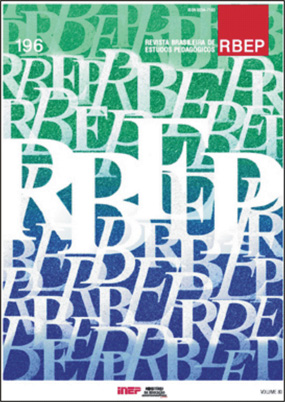Educação jesuítica e crianças negras no Brasil colonial
Resumen
Realça um aspecto pouco estudado da história da educação brasileira no período colonial: a educação de crianças negras nos colégios jesuíticos. As crianças eram filhas de escravos desafricanizados, que nasciam nas fazendas de propriedade da Companhia de Jesus. A literatura, tradicionalmente, situa a empresa jesuítica relacionada apenas com as crianças brancas, indígenas, mamelucas e mulatas. A base da conversão dos "gentios" ao cristianismo era a catequese, realizada pelo ensino mnemônico. Nesse contexto, as crianças negras sofriam dois tipos de violência: nasciam marcadas pela maldição social da escravidão e estavam submetidas a um processo brutal de aculturação gerada pela visão cristã de mundo. Palavras-chave: educação colonial; colégios jesuíticos; crianças negras. Abstract The purpose of this article is to emphasize an aspect that is not much studied in the Brazilian education, during the colonial period. We are talking about the black children in the Jesuit schools; in other words, the children of the slaves who were forced out of their African roots, children who were born in the farms belonging to the Brotherhood of Jesus. Usually, literature traditionally places the Jesuit educational enterprise only among white, indigenous, mameluke and mulatto children. The basis of conversion of the "gentiles" to Christianity was the catechism done through mnemonic teaching. In such context, the black children suffered two types of violence: they were born tagged by the social curse of slavery and were subject to a brutal process of acculturation brought about by the Christian worldview. Keywords: colonial education; jesuit schools; black children.Descargas
La descarga de datos todavía no está disponible.
Publicado
01-12-1999
Cómo citar
JÚNIOR, A. F.; BITTAR, M. Educação jesuítica e crianças negras no Brasil colonial. Revista Brasileña de Estudios Pedagógicos, v. 80, n. 196, 1 dic. 1999.
Número
Sección
Estudios
La aceptación del artículo implica automáticamente la cesión de sus derechos de autor al Instituto Nacional de Estudios e Investigaciones Educativas Anísio Teixeira (INEP).
La Revista Brasileña de Estudios Pedagógicos adopta, desde 2016, la licencia CC-BY.
Se permite la reproducción total o parcial de los artículos de la Revista siempre que se mencione la fuente de la publicación original y el enlace a la licencia CC BY 4.0 y que se indique cualquier cambio en el texto.




















